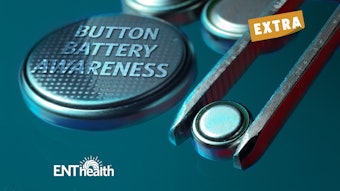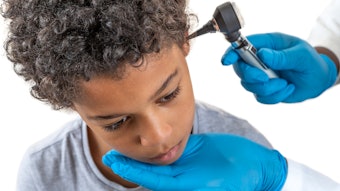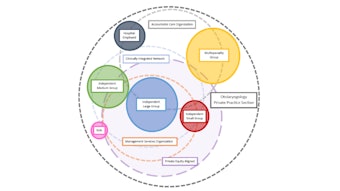Be Festive, Stay Safe!
Tips for your patients this holiday season to minimize noise exposure, prevent choking hazards, reduce the risk of infections, and more.
Mathieu Bergeron, MD, Ryan H. Belcher, MD, MPH, John P. Dahl, MD, PhD, MBA, James M. Ruda, MD (Chair), and Abhita T. Reddy, MD, MBA, Pediatric Otolaryngology Committee
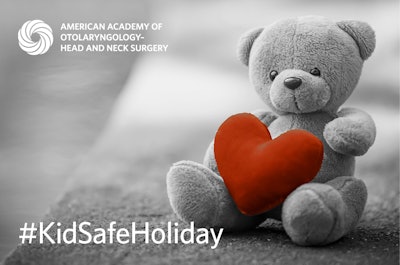
The holiday season is also a time when children will be trying new foods and drinks that are more frequently encountered this time of year. With this in mind, the Pediatric Otolaryngology Committee would like to provide some tips and guidance so all can enjoy this special time of year in a safe manner. These tips for your patients include ensuring safe food and drink, minimizing noise exposure, preventing choking hazards, and reducing the risk of infections.
Avoiding Food and Drink Hazards
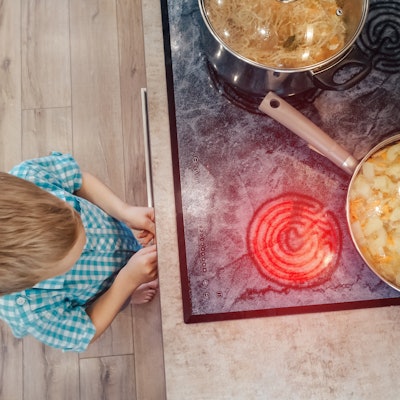
- Many of the foods used as party favorites can also be choking hazards for small children, such as bowls of nuts, candies, popcorn, seeds and/or cheese cubes.
- If cooking food on a stovetop, in order to prevent possible burns from children pulling down on pot handles, be sure to cook on the back burners when possible and turn pot handles away from the front. Do not leave cooking food unattended.
- It is recommended to keep children at least three feet away from the stove. One option to keep children entertained (and out of the kitchen) is to set up activities, such as puzzles, books, or games, in another room.
- Always keep the oven door closed and keep appliances clean to prevent potential grease or other types of fires.
- Other items in the kitchen can be dangerous for children, including knives and dangling electric cords. Maintain a safe environment by keeping these items toward the back of the counter and out of reach.
- Children often mimic adults, so if family members are having alcoholic beverages, be sure to keep cups (empty or partially filled) out of reach of small children to prevent accidental alcohol poisoning. Even small amounts of alcohol can be dangerous for children.
Avoiding Choking Hazards

To avoid any situations that could result in serious consequences, here are some reminders.
- Toys are specifically designed to be used by children within a certain age range. These age guidelines take into account the safety of a toy based on any possible choking hazard. It is important to avoid letting young children play with toys designed for older children, as they may pose a potential danger to their safety.
- Supervise children during mealtimes and encourage them to sit down while eating. Children should also chew their food well and avoid running, walking, playing, or lying down with food in their mouths. It is also important to be aware of older children’s actions.
- Note that toddlers are not capable of grinding nuts, or even nut fragments, into a paste that would allow them to swallow safely. Peanuts and almonds are the most commonly found nuts in the bronchi, and peanuts are known to cause more bronchial inflammation than any other food. Both sunflower seeds and their shells are choking hazards and should be avoided.
- Cut grapes, cherry tomatoes, and other round fruits into small pieces until children are at least five years old.
- It is common for coins to get stuck in the esophagus, which is why they usually need to be removed under general anesthesia. If a coin gets lodged in the larynx, it could be life-threatening. Toddlers and young children should be kept away from small objects such as coins, button batteries, rings, and earrings to prevent accidental ingestion.
- Button batteries pose a serious risk to children, as they can be found in various materials such as holiday musical cards and small toys with lights and sounds, and holiday decorations. Because of their compact size, button batteries are easily ingested by small children. When these batteries come in contact with saliva, an alkalizing reaction can occur, leading to erosion of a child's esophagus. This can cause permanent damage and even death. It is important to be aware of the dangers of button batteries and to keep them out of reach of children. Unfortunately, more than 3,000 children ingest button batteries in the U.S. each year.
Protections against Illnesses
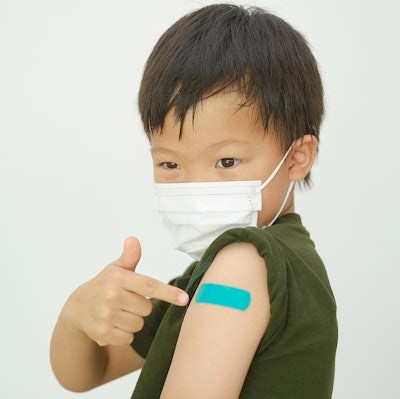
- It remains critically important to ensure your child’s vaccinations (COVID, influenza, respiratory syncytial virus, if relevant) are up to date.
- Performing appropriate hand hygiene and staying home or postponing events when you or a family member have signs and symptoms of an upper respiratory infection will help reduce the risk of spreading these illnesses during the holiday season.
- Wearing masks correctly can reduce the risk of viral infection and provide general protection during the holidays, especially if you are unable to isolate yourself while infected.
Hearing Protection
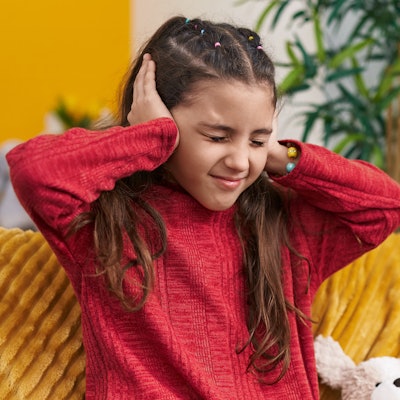
- The decibel level of the sound
- The distance between you and the source of the sound
- The length of time you are exposed to the sound.
Therefore, it is important to be mindful of these factors and take steps to protect your children’s hearing, such as wearing earplugs or reducing exposure to loud sounds when possible.
Here are some tips to help keep the noise down during the holidays:
- When selecting gifts, choose quiet toys and gadgets such as books or puzzles. In general, sounds under 70 dB are considered safe, while sounds at 110 dB (e.g., concerts) can cause damage in as little as two minutes.
- If your child has received a new toy that is too noisy and is driving you crazy, you can take some steps to make it safer and more comfortable for everyone. One option is to put masking tape over the toy's speaker to reduce the volume. This should be enough to muffle the sound and make it bearable. Some toys come with volume controls that allow you to lower the volume or turn off the sound entirely. When using toys, instruct your kids to only turn on one at a time.
- Before buying a toy, it's a good idea to test it out in the store and check the sound levels. If the sound irritates you after just a few minutes at the store, it might be better to consider a different gift option for your own sake or for other parents.
- If you're planning to attend any local seasonal concerts or festivals, it's crucial to bring hearing protectors such as earplugs or earmuffs. The louder the sound, the quicker the damage to your hearing. This applies not only to concerts and festivals but also to sporting events. Make sure to include hearing protectors for both adults and children. If you forget your ear protection, move away from the loudspeakers. Do not stand or sit directly in front of them.
- It is crucial to prevent multiple sources of noise from overlapping in the same space, which might be amplified with TV and tablets. We can all remember those noisy evenings filled with loud conversations, laughter, music, and brand-new noisy toys.
Managing Complications
Here are some final tips for a stress-free holiday season by preventing and managing complications.
- If your child experiences a choking event from food, it is recommended to call your doctor immediately or consider going to the emergency department for evaluation.
- Should a burn occur on a child, immediate evaluation from a medical professional is recommended.
- Parents should remember that homes or venues hosting holiday events may not be childproofed. This requires family members to carefully supervise children in these new environments to ensure they are safe spaces.
- It is important to maintain a list of important contact numbers readily available, including the National Poison Control Hotline (800-222-1222) and primary care providers.
- Any ingestion of button batteries requires an immediate emergency department visit.
The holiday season should be a time for spending quality time with your family and friends in the comfort of your own home, rather than rushing to the emergency department. By taking proper precautions and staying mindful of potential hazards, you can help ensure a joyful and healthy holiday season for you and your loved ones.
Resources
https://www.noisyplanet.nidcd.nih.gov/have-you-heard/season-to-protect-your-hearing
https://healthychildren.org/English/health-issues/injuries-emergencies/Pages/Choking-Prevention.aspx
https://www.enthealth.org/health_and_wellness_categories/kids-ent-health-wellness-and-prevention/
https://www.enthealth.org/be_ent_smart/button-battery-awareness/
